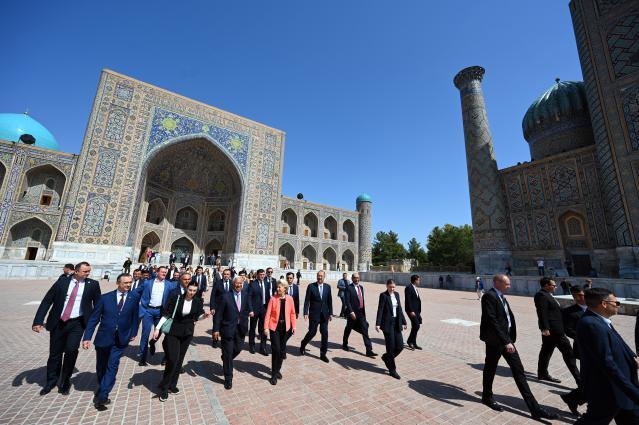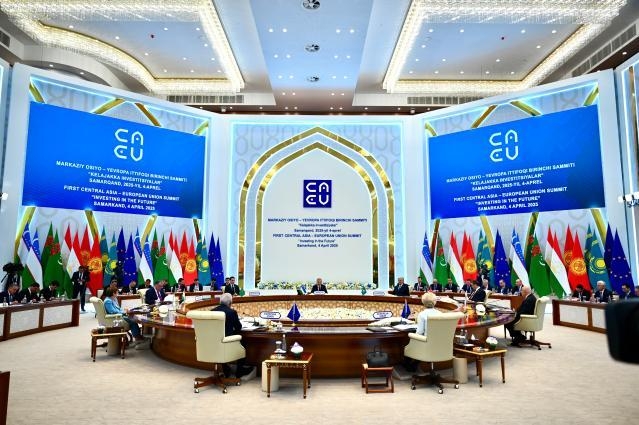The first Central Asia - European Union Summit was held on Friday in Samarkand, Uzbekistan, and ended with a joint press release where EU and Central Asia leaders agreed to elevate the relations between the two regions by establishing strategic partnerships.
The EU was represented by Commission President Ursula von der Leyen and Council President António Costa. During their visit they met the presidents of the five Central Asia countries: Shavkat Mirziyoyev, Uzbekistan, Kassym-Jomart Tokayev, Kazakhstan, Sadyr Japarov, Kyrgyzstan, Emomali Rahmon, Tajikistan, and Serdar Berdimuhamedov, Turkmenistan.
Costa said at the concluding press conference that the partnerships with Kazakhstan and Kyrgyzstan had already been signed last year. The partnership with Uzbekistan will be signed this year and with the other countries next year.
According to the Commission, the aim of the visit was to send a strong signal of the EU’s political commitment to a deeper and stronger partnership with Central Asia. “We are heading to Samarkand to take our partnership with Central Asia to the next level. In these uncertain times,” von der Leyen said. “Europe stands for openness and engagement. For Europe, Central Asia is a partner of choice.”
In her speech at the press conference, von der Leyen described Central Asia as a region of proud, sovereign nations with ancient histories and great ambitions. “Your strategic location can open global trade routes and investment flows. And these new investments will enhance sovereignty. They will strengthen your economies, and most importantly they will make new friendships.”
“We Europeans want to be partners in this new chapter in your thousand-year history,” she said and described four priority areas: the Trans-Caspian Transport Corridor which will cut the overland journey between Europe and Central Asia by around a half, raw materials, clean energy, and digital connectivity. To accelerate progress, she announced a Global Gateway Investment Package worth €12 billion.
She highlighted cooperation on critical raw materials. The region has 40% of the global reserves of manganese, as well as lithium, graphite, and more, which are needed to power the green economy.
“These raw materials are the lifeblood of the future global economy. Yet they are also a honeypot for global players,” she said referring to Russia and China. “Some are only interested in exploiting and extracting. Europe's offer is different. We also want to be your partners in developing your local industries.” She promised that EU investmenst will stimulate local value chains.

View of Samarkand, credit: EU
Asked how the EU would convince the Central Asian countries that it is a better business partner than its competitors, she replied that the EU is reliable and predictable, and that the others are only interested in extracting raw materials without adding value for them. Costa said that the EU and Central Asia share the same vision of a rule-based international order, including respect for territorial integrity.
“Central Asia and the European Union are traditional partners, and the need for close co-operation is only growing,” commented Mirziyoyev, the host of the Summit.
“The development of our multifaceted co-operation is facilitated by the profound transformation in Central Asia, which has become sustainable and irreversible thanks to common political will. Our summit will result in a historic decision to establish a strategic partnership between Central Asia and the European Union.”
He emphasised the importance of introducing mechanisms for the practical implementation of our initiatives and agreements.
Before the visit, the Commission’s chief spokesperson was asked if concerns about press freedom would be raised. She replied that such issues are normally raised in the bilateral talks. The joint press release says that the leaders expressed their commitment to regional and global stability, particularly in Afghanistan and Ukraine, and to the promotion and protection of the rule of law, human rights and fundamental freedoms.
According to the press release, there is a growing momentum in the EU-Central Asia relations with a view to securing enhanced bilateral cooperation in several key areas, as well as a shared commitment to peace, security, democracy, and the fundamental principles of international law (the words in bold in the original text).
The five central Asian countries, parts of former Soviet Union, are maneuvering carefully in their relations with Russia, both economically and politically. The EU could have wanted that they would condemn Russia’s war of aggression against Ukraine but in the latest vote in February in the UN General Assembly they all abstained from voting.
As regards political rights and civil liberties, they are all ranked as Not Free in Freedom House Index 2025. They have also low scores in International Transparency’s latest Corruption Perception Index. The only exceptions are Kazakhstan and Uzbekistan, where the scores show an upwards trend approaching the lowest scores in some EU member states.
M. Apelblat
The Brussels Times

